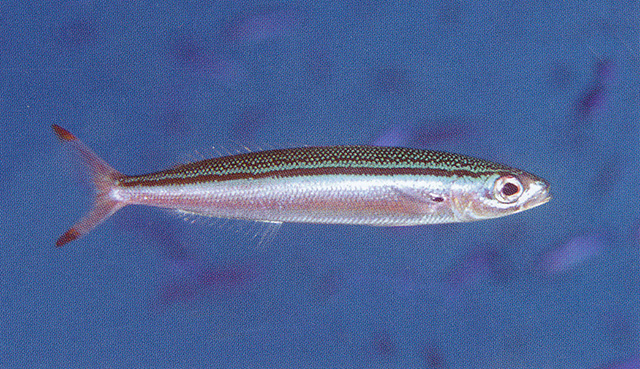
|
Gymnocaesio gymnoptera (Bleeker, 1856) Slender fusilier |
||
Dalagang bukid Slender fusilier, Aspe, Banlisan, Bilason, Dalagang bukid, Lasaw, Solid, Solid, Solig, Sulid, |
||

|
|
photo by
Allen, G.R. |
| Family: | Caesionidae (Fusiliers), subfamily: Gymnocaesioninae | |||
| Max. size: | 18 cm TL (male/unsexed) | |||
| Environment: | reef-associated; depth range 0 - 500 m, non-migratory | |||
| Distribution: | Indo-West Pacific: Red Sea and East Africa to Fiji, north to the Philippines. | |||
| Diagnosis: | Dorsal spines (total): 10-11; Dorsal soft rays (total): 14-16; Anal spines: 3-3; Anal soft rays: 11-13. Description: Body bluish green dorsally; center of scales lighter, giving a striped appearance. Tips of caudal lobes black. Usually 4 scales on cheek; usually 23-26 predorsal scales; dorsal and anal fins without scales. Upper peduncular scale rows usually 11 (11-12); lower peduncular scale rows usually 14 or 15 (13-15). Post maxillary with 2 processes; posterior end of maxilla tapered. Unlike the species of Caesio and Pterocaesio, the anterior profile of the 1st anal pterygiophore is without a pronounced distal convexity (Ref. 402). Head length 3.0-4.3 in SL; body depth 3.3-6.0 in SL, slender (Ref. 90102). | |||
| Biology: | Inhabits coastal areas around coral reefs (Ref. 30573). Feeds on zooplankton in large midwater aggregations. Forms schools with members of the genus Pterocaesio. Oviparous, with numerous, small pelagic eggs (Ref. 402). Often mistaken for juveniles and easily overlooked because of small size (Ref. 48636). Also caught with drive-in nets. Utilized as tuna bait fish (Ref. 30573). | |||
| IUCN Red List Status: | (Ref. 96402) | |||
| Threat to humans: | harmless | |||
| Country info: | Museum: BPBM 28804, 23487, 30738, 30776, 30777, 30761, 30740, 30757, 30758. Also Ref. 1723, 37816. | |||
| Entered by: Luna, Susan M. - 17.10.90 |
| Modified by: Kesner-Reyes, Kathleen - 29.03.06 |
| Checked by: Carpenter, Kent E. - 16.09.93 |